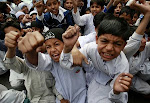WASHINGTON — A growing number of U.S. intelligence, defense and diplomatic officials have concluded that there's little hope of preventing nuclear-armed Pakistan from disintegrating into fiefdoms controlled by Islamist warlords and terrorists, posing a greater threat to the U.S. than Afghanistan's terrorist haven did before 9/11.
"It's a disaster in the making on the scale of the Iranian revolution," said a U.S. intelligence official with long experience in Pakistan who requested anonymity because he wasn't authorized to speak publicly.
Pakistan's fragmentation into warlord-run fiefdoms that host al Qaida and other terrorist groups would have grave implications for the security of its nuclear arsenal; for the U.S.-led effort to pacify Afghanistan; and for the security of India, the nearby oil-rich Persian Gulf and Central Asia, the U.S. and its allies.
"Pakistan has 173 million people and 100 nuclear weapons, an army which is bigger than the American army, and the headquarters of al Qaida sitting in two-thirds of the country which the government does not control," said David Kilcullen, a retired Australian army officer, a former State Department adviser and a counterinsurgency consultant to the Obama administration.
"Pakistan isn't Afghanistan, a backward, isolated, landlocked place that outsiders get interested in about once a century," agreed the U.S. intelligence official. "It's a developed state . . . (with) a major Indian Ocean port and ties to the outside world, especially the (Persian) Gulf, that Afghanistan and the Taliban never had."
"The implications of this are disastrous for the U.S.," he added. "The supply lines (from Karachi to U.S. bases) in Kandahar and Kabul from the south and east will be cut, or at least they'll be less secure, and probably sooner rather than later, and that will jeopardize the mission in Afghanistan, especially now that it's getting bigger."
The experts McClatchy interviewed said their views aren't a worst case scenario but a realistic expectation based on the militants' gains and the failure of Pakistan's civilian and military leadership to respond.
"The place is beyond redemption," said a Pentagon adviser who asked not to be further identified so he could speak freely. "I don't see any plausible scenario under which the present government or its most likely successor will mobilize the economic, political and security resources to push back this rising tide of violence.
"I think Pakistan is moving toward a situation where the extremists control virtually all of the countryside and the government controls only the urban centers," he continued. "If you look out 10 years, I think the government will be overrun by Islamic militants."...
If you think Iranian nukes are scary, just think about the terror that will be loosed across the globe with these terrorists in charge of Pakistan.
12 years ago






















No comments:
Post a Comment